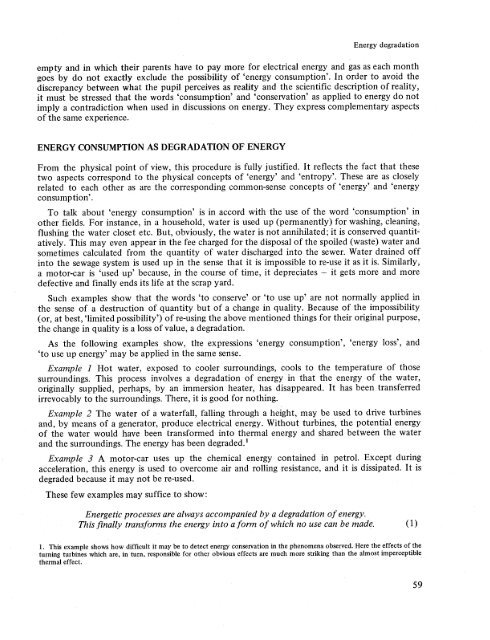New trends in physics teaching, v.4; The ... - unesdoc - Unesco
New trends in physics teaching, v.4; The ... - unesdoc - Unesco
New trends in physics teaching, v.4; The ... - unesdoc - Unesco
Create successful ePaper yourself
Turn your PDF publications into a flip-book with our unique Google optimized e-Paper software.
Energy degradation<br />
empty and <strong>in</strong> which their parents have to pay more for electrical energy and gas as each month<br />
goes by do not exactly exclude the possibility of ‘energy consumption’. In order to avoid the<br />
discrepancy between what the pupil perceives as reality and the scientific description of reality,<br />
it must be stressed that the words ‘consumption’ and ‘conservation’ as applied to energy do not<br />
imply a contradiction when used <strong>in</strong> discussions on energy. <strong>The</strong>y express complementary aspects<br />
of the same experience.<br />
ENERGY CONSUMPTION AS DEGRADATION OF ENERGY<br />
From the physical po<strong>in</strong>t of view, this procedure is fully justified. It reflects the fact that these<br />
two aspects correspond to the physical concepts of ‘energy’ and ‘entropy’. <strong>The</strong>se are as closely<br />
related to each other as are the correspond<strong>in</strong>g common-sense concepts of ‘energy’ and ‘energy<br />
consump tion’.<br />
To talk about ‘energy consumption’ is <strong>in</strong> accord with the use of the word ‘consumption’ <strong>in</strong><br />
other fields. For <strong>in</strong>stance, <strong>in</strong> a household, water is used up (permanently) for wash<strong>in</strong>g, clean<strong>in</strong>g,<br />
flush<strong>in</strong>g the water closet etc. But, obviously, the water is not annihilated; it is conserved quantitatively.<br />
This may even appear <strong>in</strong> the fee charged for the disposal of the spoiled (waste) water and<br />
sometimes calculated from the quantity of water discharged <strong>in</strong>to the sewer. Water dra<strong>in</strong>ed off<br />
<strong>in</strong>to the sewage system is used up <strong>in</strong> the sense that it is impossible to re-use it as it is. Similarly,<br />
a motor-car is ‘used up’ because, <strong>in</strong> the course of time, it depreciates - it gets more and more<br />
defective and f<strong>in</strong>ally ends its life at the scrap yard.<br />
Such examples show that the words ‘to conserve’ or ‘to use up’ are not normally applied <strong>in</strong><br />
the sense of a destruction of quantity but of a change <strong>in</strong> quality. Because of the impossibility<br />
(or, at best, ‘limited possibility’) of re-us<strong>in</strong>g the above mentioned th<strong>in</strong>gs for their orig<strong>in</strong>al purpose,<br />
the change <strong>in</strong> quality is a loss of value, a degradation.<br />
As the follow<strong>in</strong>g examples show, the expressions ‘energy consumption’, ‘energy loss’, and<br />
‘to use up energy’ may be applied <strong>in</strong> the same sense.<br />
Example I Hot water, exposed to cooler surround<strong>in</strong>gs, cools to the temperature of those<br />
surround<strong>in</strong>gs. This process <strong>in</strong>volves a degradation of energy <strong>in</strong> that the energy of the water,<br />
orig<strong>in</strong>ally supplied, perhaps, by an immersion heater, has disappeared. It has been transferred<br />
irrevocably to the surround<strong>in</strong>gs. <strong>The</strong>re, it is good for noth<strong>in</strong>g.<br />
Example 2 <strong>The</strong> water of a waterfall, fall<strong>in</strong>g through a height, may be used to drive turb<strong>in</strong>es<br />
and, by means of a generator, produce electrical energy. Without turb<strong>in</strong>es, the potential energy<br />
of the water would have been transformed <strong>in</strong>to thermal energy and shared between the water<br />
and the surround<strong>in</strong>gs. <strong>The</strong> energy has been degraded.’<br />
Example 3 A motor-car uses up the chemical energy conta<strong>in</strong>ed <strong>in</strong> petrol. Except dur<strong>in</strong>g<br />
acceleration, this energy is used to overcome air and roll<strong>in</strong>g resistance, and it is dissipated. It is<br />
degraded because it may not be re-used.<br />
<strong>The</strong>se few examples may suffice to show:<br />
Energetic processes are always accompanied by a degradation of energy.<br />
This f<strong>in</strong>ally transforms the energy <strong>in</strong>to a form of which no use can be made. (1)<br />
1. This example shows how difficult it may be to detect energy conservation <strong>in</strong> the phenomena observed. Here the effects of the<br />
turn<strong>in</strong>g turb<strong>in</strong>es which are, <strong>in</strong> turn, responsible for other obvious effects are much more strik<strong>in</strong>g than the almost imperceptible<br />
thermal effect.<br />
59
















